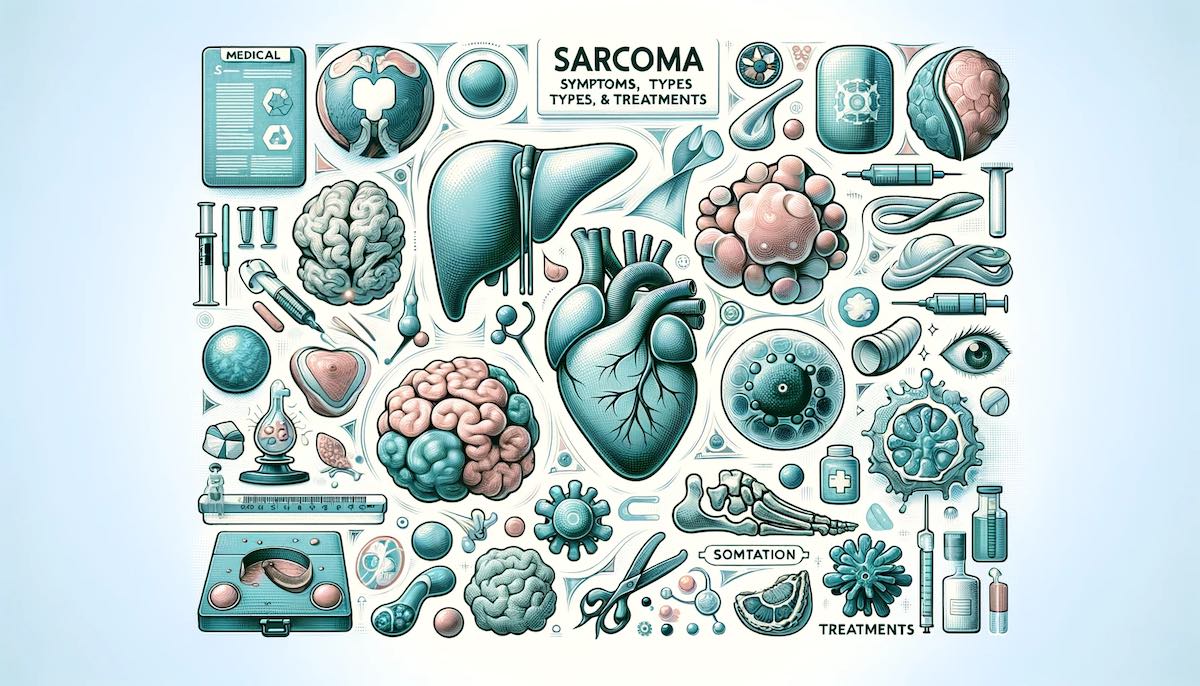Sarcoma: Symptoms, Types, and Treatments

Sarcoma, a term that often brings a sense of uncertainty, refers to a rare group of cancers originating in the bones and soft tissues. Understanding sarcoma is crucial, not just for those affected, but for everyone, as awareness can lead to timely diagnosis and treatment. In this comprehensive guide, we delve into what sarcoma is, its various types, symptoms, causes, diagnosis procedures, and available treatments.
What is Sarcoma?
Sarcoma is a type of cancer that develops in connective tissues, such as bone, muscle, fat, and cartilage. Unlike most cancers that begin in the organs or skin, sarcomas are unique in their origin and behavior. They are relatively rare, accounting for less than 1% of all cancer diagnoses. However, their rarity doesn’t diminish their impact on patients and families.
Types of Sarcoma
Sarcoma is broadly categorized into two main types, with several subtypes under each. Understanding these types helps in identifying the nature of the cancer and determining the most effective treatment approach.
Bone Sarcomas
- Osteosarcoma:
- Most common in teenagers and young adults.
- Typically develops in areas where the bone grows rapidly, like the knee or upper arm.
- Chondrosarcoma:
- Develops in the cartilage.
- More common in adults over 40 years.
- Ewing’s Sarcoma:
- Occurs in bones and soft tissues.
- Primarily affects children and adolescents.
Soft Tissue Sarcomas
- Leiomyosarcoma:
- Originates in smooth muscle cells.
- Often found in the abdomen, uterus, or blood vessels.
- Liposarcoma:
- Develops in fat cells.
- Commonly occurs in the thighs, behind the knee, and in the back.
- Synovial Sarcoma:
- Affects the tissues around joints, like tendons or synovial fluid.
- Mostly found in the legs or arms of young adults.
- Gastrointestinal Stromal Tumors (GIST):
- Arises in the digestive tract, most often in the stomach or small intestine.
- More prevalent in adults over 50 years.
- Fibrosarcoma:
- Develops in fibrous tissue, often affecting the legs, arms, or trunk.
- Can occur at any age but is more typical in adults.
Each of these sarcoma types has unique characteristics, and their treatment can vary significantly. It’s important to consult with a healthcare professional for an accurate diagnosis and personalized treatment plan.
Symptoms of Sarcoma
The symptoms of sarcoma vary depending on the tumor’s location and size. Common signs include:
- A noticeable lump or swelling
- Pain in the affected area, often worsening at night
- Unexplained fatigue
- Weight loss without a clear cause
Get a Medical Opinion
Fill out the form and we will contact you shortly.
Causes and Risk Factors
The exact causes of sarcoma are not fully understood, but certain factors increase the risk, such as genetic disorders like Li-Fraumeni syndrome, exposure to certain chemicals, and a history of radiation therapy.
Diagnosis of Sarcoma
Diagnosing sarcoma involves a combination of methods:
- Physical examination
- Imaging tests like X-rays, CT scans, and MRIs
- Biopsy, where a tissue sample is taken for analysis
Treatment Options
Treatment varies based on the type, size, and location of the sarcoma, and may include:
- Surgery to remove the tumor
- Radiation therapy
- Chemotherapy
- Targeted therapy in certain cases
Conclusion
While sarcoma is a challenging diagnosis, advancements in medicine have improved treatment outcomes significantly. Early detection and personalized treatment plans are key to managing this rare cancer effectively. If you or someone you know is experiencing symptoms or has concerns about sarcoma, consult a healthcare professional for a thorough evaluation.
Contact Information
- WhatsApp: +90 541 469 11 94
- Email: [email protected]
We connect you with top medical specialists and provide comprehensive support to optimize your healthcare decisions. Empowering you to make informed choices for a healthier futu
Get a Medical Opinion
Fill out the form and we will contact you shortly.